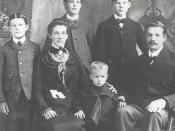REVIEW OF LITERATUREThis chapter will review literature on cooperative learning, academic performance and social skills.
Cooperative LearningAccording to Johnson and Johnson (2001), cooperation is working together to accomplish shared goals. Within cooperative activities individuals seek outcomes that are beneficial to themselves and beneficial to all group members. Cooperative learning is the instructional use of small groups so that students work together to maximize their own and each other's learning. The idea is simple. Class members are organized into small groups after receiving instruction from the teacher. They then work through the assignment until all group members successfully understand and complete it. Cooperative efforts result in participants striving for mutual benefit so that all group members gain from each other's efforts (Your success benefits me and my success benefits you), recognizing that all group members share common fate (We all sink or swim together), knowing that one's performance is mutually caused by oneself and one's colleagues (We cannot do it without you), and feeling proud and jointly celebrating when a group member is recognized for achievement (We all congratulate you on your accomplishment!).
The roots of cooperative learning may be traced to John Dewey (1933) who emphasized education as a vehicle for teaching citizens to live cooperatively in a social democracy. A second major figure in the history of cooperative learning is social psychologist Kurt Lewin, who in the 1930's and 1940's emphasized the importance of group dynamics in understanding the behaviour of leaders and members of democratic groups.
Slavin (1995) states that there are several reasons why cooperative learning works as well as it does. The idea that students learn more by doing something active than by simply watching and listening has long been known to both cognitive psychologists and effective teachers. Recent research done by Mclnnerney and Roberts...


